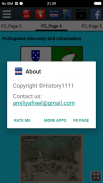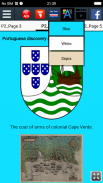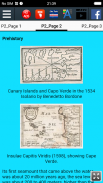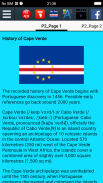








History of Cape Verde

คำอธิบายของHistory of Cape Verde
The recorded history of Cape Verde begins with Portuguese discovery in 1456. Possible early references go back around 2000 years.
Cape Verde (/ˌkeɪp ˈvɜːrd/) or Cabo Verde (/ˌkɑːboʊ ˈvɜːrdeɪ/, /ˌkæb-/) (Portuguese: Cabo Verde, pronounced [ˈkaβu ˈveɾðɨ]), officially the Republic of Cabo Verde,[9] is an island country spanning an archipelago of 10 volcanic islands in the central Atlantic Ocean. Located 570 kilometres (350 mi) west of the Cape Verde Peninsula in West Africa, the islands cover a combined area of slightly over 4,000 square kilometres (1,500 sq mi).
The Cape Verde archipelago was uninhabited until the 15th century, when Portuguese explorers discovered and colonized the islands, establishing the first European settlement in the tropics. Ideally located for the Atlantic slave trade, the islands grew prosperous throughout the 16th and 17th centuries, attracting merchants, privateers, and pirates. The end of slavery in the 19th century led to economic decline and emigration. Cape Verde gradually recovered as an important commercial center and stopover for shipping routes. Incorporated as an overseas department of Portugal in 1951, the islands continued to agitate for independence, which was peacefully achieved in 1975.
Since the early 1990s, Cape Verde has been a stable representative democracy, and remains one of the most developed and democratic countries in Africa. Lacking natural resources, its developing economy is mostly service-oriented, with a growing focus on tourism and foreign investment. Its population of around 512,000 is mostly of mixed African, Moorish, Arab and European heritage, and predominantly Roman Catholic, reflecting the legacy of Portuguese rule. A sizeable diaspora community exists across the world, slightly outnumbering inhabitants on the islands.
Historically, the name "Cape Verde" has been used in English for the archipelago and, since independence in 1975, for the country. In 2013, the Cape Verdean government determined that the Portuguese designation Cabo Verde would henceforth be used for official purposes, such as at the United Nations, even in English contexts. Cape Verde is a member of the African Union.
บันทึกประวัติศาสตร์ของเคปเวิร์ดเริ่มต้นด้วยการค้นพบโปรตุเกสใน 1456. อ้างอิงในช่วงต้นเป็นไปได้กลับไปรอบ 2000 ปี
เคปเวิร์ด (/ ˌkeɪpvɜːrd /) หรือ Cabo Verde (/ ˌkɑːboʊvɜːrdeɪ / / ˌkæb- /) (โปรตุเกส: Cabo Verde เด่นชัด [kaβuveɾðɨ]) อย่างเป็นทางการสาธารณรัฐ Cabo Verde, [9] เป็นประเทศเกาะที่ทอด หมู่เกาะ 10 เกาะภูเขาไฟในภาคกลางมหาสมุทรแอตแลนติก ตั้งอยู่ 570 กิโลเมตร (350 ไมล์) ทางตะวันตกของคาบสมุทรเคปเวิร์ดในแอฟริกาตะวันตก, เกาะครอบคลุมพื้นที่รวมน้อยกว่า 4,000 ตารางกิโลเมตร (1,500 ตารางไมล์)
หมู่เกาะเคปเวิร์ดถูกไม่มีใครอยู่จนกระทั่งศตวรรษที่ 15 เมื่อนักสำรวจชาวโปรตุเกสค้นพบและอาณานิคมเกาะจัดตั้งนิคมยุโรปครั้งแรกในเขตร้อน ตั้งอยู่ทำเลที่เหมาะสำหรับการค้าทาสมหาสมุทรแอตแลนติกเกาะเติบโตเจริญรุ่งเรืองตลอดศตวรรษที่ 16 และ 17 ดึงดูดพ่อค้า privateers และโจรสลัด ในตอนท้ายของการเป็นทาสในศตวรรษที่ 19 นำไปสู่การลดลงของเศรษฐกิจและการย้ายถิ่นฐาน เคปเวิร์ดค่อยๆหายเป็นศูนย์กลางการค้าที่สำคัญและจุดแวะพักสำหรับเส้นทางการจัดส่งสินค้า รวมเป็นแผนกต่างประเทศของโปรตุเกสในปี 1951 เกาะยังคงรณรงค์เพื่อความเป็นอิสระซึ่งก็ประสบความสำเร็จอย่างสงบในปี 1975
ตั้งแต่ต้นปี 1990, เคปเวิร์ดได้รับตัวแทนประชาธิปไตยที่มีเสถียรภาพและยังคงเป็นหนึ่งในประเทศที่พัฒนามากที่สุดและเป็นประชาธิปไตยในแอฟริกา ขาดทรัพยากรธรรมชาติพัฒนาเศรษฐกิจของตนเป็นส่วนใหญ่มุ่งเน้นบริการที่มีความสำคัญในการเจริญเติบโตของการท่องเที่ยวและการลงทุนจากต่างประเทศ ประชากรประมาณ 512,000 ส่วนใหญ่จะเป็นของผสมแอฟริกัน, มัวร์, คาทอลิคส์และมรดกทางวัฒนธรรมของยุโรปและส่วนใหญ่โรมันสะท้อนให้เห็นถึงมรดกของกฎโปรตุเกส ชุมชนพลัดถิ่นขนาดใหญ่ที่มีอยู่ทั่วโลกเล็กน้อยเปรียบคนที่อาศัยอยู่บนเกาะ
ในอดีตที่ชื่อ "เคปเวิร์ด" ได้ถูกนำมาใช้ในภาษาอังกฤษสำหรับหมู่เกาะและตั้งแต่ความเป็นอิสระในปี 1975 สำหรับประเทศ ในปี 2013 รัฐบาลเคปเวอร์ระบุว่าการแต่งตั้งโปรตุเกส Cabo Verde จะต่อจากนี้ไปใช้เพื่อวัตถุประสงค์อย่างเป็นทางการเช่นที่ยูเอ็นแม้ในบริบทภาษาอังกฤษ เคปเวิร์ดเป็นสมาชิกของสหภาพแอฟริกัน

























